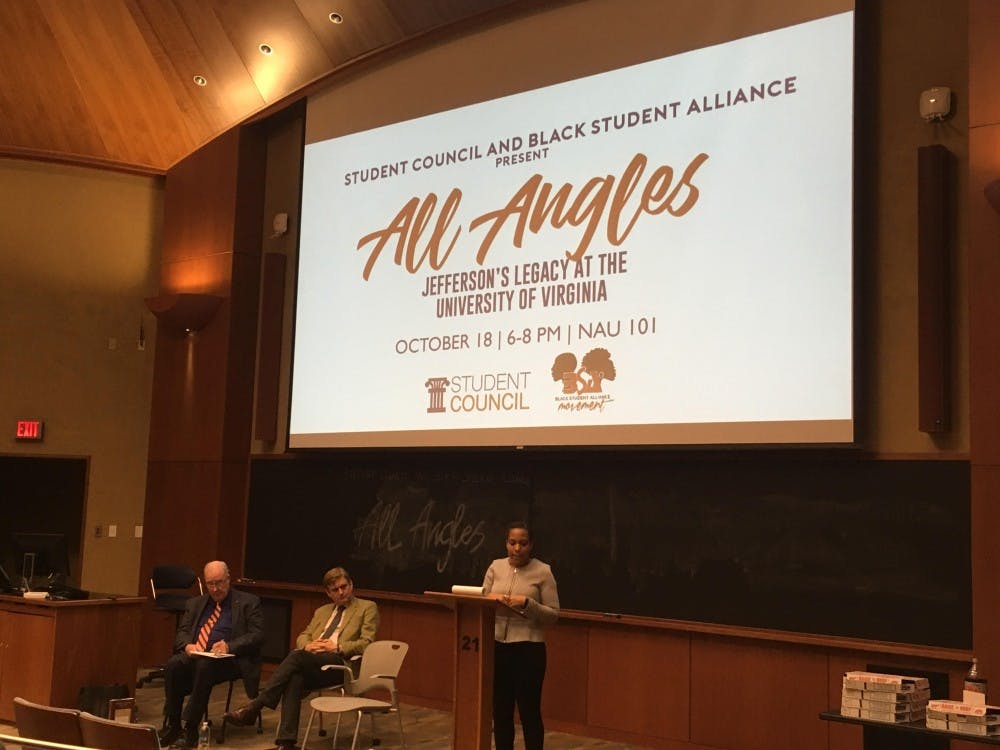Student Council and the Black Student Alliance came together Wednesday evening to co-host a forum designed to encourage dialogue about Thomas Jefferson and his representation at the University. The event was titled, “All Angles: Jefferson’s Legacy at the University of Virginia” and gave three professors an opportunity to present different perspectives on Thomas Jefferson’s legacy.
Approximately 45 students attended the forum. The panel included Monticello Vice President Andrew O’Shaughnessy, Petal Samuel, a postdoctoral fellow in the University’s Department of African-American Studies and Law Prof. Robert Turner.
Megha Karthikeyan, a second-year College student, and Stuart deButts, a fourth-year College student, are the co-chairs of the Student Council’s Bicentennial Committee. They had been planning this event for the past month and a half in conjunction with the BSA.
Karthikeyan said the goal of Wednesday’s forum was to encourage dialogue among students about what can be done to ensure students from different perspectives feel they are being heard.
“We’re hoping when students come to this event they’ll be able to see the varying perspectives that people have, and maybe be able to figure out what their opinion is and what their position is,” Karthikeyan said. “I think the event will hopefully open up people’s horizons and they’ll understand all perspectives in regards to Jefferson and history at U.Va.”
Debutts said it is important for students to listen to each other at a time when many citizens are divided on issues.
Samuel expressed her approval of the partnership between the BSA and the Student Council in an interview with The Cavalier Daily.
“Our discussions about Jefferson and about Jefferson’s relationship to slavery are fundamentally rooted in contemporary concerns, so the reason this matters to us in any way is because we are still living in the aftermath of slavery,” Samuel said. “Black students at U.Va. are the ones living those realities most acutely, so without partnering with them and including them in the discussion, the discussion would be fundamentally incomplete.”
The panelists at the forum expressed a wide variety of opinions on Jefferson’s legacy at the University in an attempt to encourage productive dialogue among the students.
O’Shaughnessy said the University’s founder is as a flawed but high-achieving man.
“Almost inevitably with the advent of civil rights we have a more nuanced view of Jefferson emerge,” O’Shaughnessy said.
He was followed by Samuel, who presented Jefferson’s legacy as fundamentally marred by his association with the institution of slavery and spoke to the resistance to open discussion she has observed.
“My comments are going to focus primarily on the rhetoric that tends to surround the debate about how we should remember Jefferson,” Samuel said. “My interest is not so much in Jefferson, per se, but in the ends to which selective narratives about Jefferson, in particular criticisms of his participation in slavery, tend to meet with very specific forms of resistance.”
Samuel said that she had more questions than answers, but expressed her hope that the students would continue to discuss Jefferson’s legacy.
“My simple but very serious question for you is this — why do we, at times, have to rescue, defend, forgive or qualify Jefferson’s participation in slavery?” Samuel said. “What do we fear criticism of Jefferson will do to us?”
The final presenter, Turner, took a strong pro-Jefferson stance.
“I’m one of those rare creatures,” Turner said. “I’m an admirer of Thomas Jefferson, and I’d like to explain why.”
Turner described Jefferson as a man ahead of his time with progressive attitudes on a variety of issues, including toward women and Native Americans.
“He was a complex man,” Turner said. “He was an imperfect man … I think calling him or condemning him for being a racist for owning slaves is at best unfair.”
Turner has a history of defending Jefferson. In an opinion piece published in The Cavalier Daily in November 2016, he referenced a letter sent to University President Teresa Sullivan by several hundred members of the student body and faculty, asking her to stop quoting Jefferson in her emails. He described the letter as “the sad spectacle of nearly 500 misinformed University professors and students seeking to ban the thoughts and words of Thomas Jefferson from our community.”
In the same article, Turner wrote, “Thomas Jefferson was a racist. But he was a reluctant racist.”
Devin Willis, a second-year College student and BSA secretary, said the purpose of an event like this is to “bring ideas to the floor.”
“I would say that the best thing to take away from this — and from all of the conversations that are occurring about reevaluating legacies — is that the purpose of this discourse is not to achieve a verdict on the individual in question,” Willis said. “That’s impossible and futile.”







